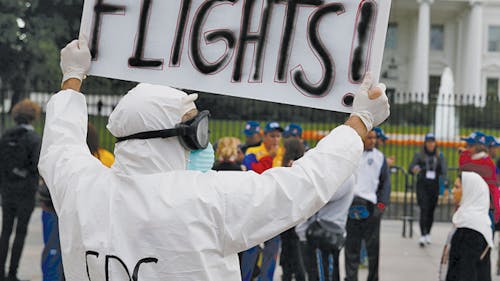Experts share concerns about Ebola in NJ

From a cough on the bus to a sniffle in the student center, fear of the Ebola virus making its way to Rutgers.
A case of Ebola has not yet been confirmed in New Jersey, but New Jerseyans have expressed concerns about an outbreak in the state.
Sixty nine percent of New Jersey residents are concerned about the possibility of an outbreak in the US, according to a Rutgers-Eagleton Institute of Politics poll released on Oct. 8.
Studies show that 42 percent believe the virus has been transmitted on American soil, and 39 percent think there is a medicine effective against Ebola.
Both of these perceptions are incorrect, said David Redlawsk, director at the Eagleton Center for Public Interest Polling. But just because Ebola is able to travel with ease, panic about Ebola coming to New Jersey is unwarranted.
“The reality is, Ebola is a little or no risk for Americans for the most part,” he said. “What’s going on is that media is essentially blowing it all of out proportion … I think it’s increasing levels of concern.”
Redlawsk, professor in the Department of Political Science, said he and his colleagues found that the people paying more attention to media coverage are less knowledgeable about Ebola risks.
Redlaswk said the Ebola virus is particularly concerning, especially because there is no cure and a high death rate. Believing it easily spreads feeds this fear.
Peter Tabbot, health officer at the Rockaway Township Health Department, said there are no suspected or known cases of Ebola in New Jersey at this time.
He said the Center for Disease Control believes there is no reason people should be alarmed at this point.
“We know that people need to be aware that if there is a history of travel to Western Africa, or if people have been in direct contact with individuals who had symptoms of disease, then those are individuals who have to be very aware of the risks,” he said.
He also mentioned that because New Jersey is home to Newark International Airport, there have been airport entry screenings conducted on people traveling from those areas of West Africa.
Of the 36,000 travelers that were screened, only 77 of them were denied boarding, he said.
At John F. Kennedy airport, 91 passengers were taken to a secondary screening. Only five of them were taken into further screening, and none of them had any issues and were released.
There are currently no passengers at JFK or at Newark that have presented a risk.
The Infectious and Zoonotic Disease Program ensures that reportable communicable diseases are investigated promptly and proper control measures put in place, according to their website.
“All of our hospitals in New Jersey need to be ready to manage a potential case of an individual that would appear at their doorstep with Ebola,” said Mary O’Dowd, New Jersey Health Commissioner, on WHYY radio.
The hospitals need to understand that when they are treating patients, they should evaluate travel history for any patient exhibiting symptoms consistent with Ebola, she said.
Just Friday, O’Dowd and Betsy Ryan, president and CEO of the New Jersey Hospital Association, sent the chief executive officers of New Jersey hospitals a request to conduct drills that would test their emergency department’s process for promptly identifying and isolating suspected Ebola patients.
The updated total number of cases reported by the Ministries of Health is just under 9,000. About 5,000 of those cases have been confirmed, and a total of 4,493 deaths have occurred, according to the CDC website.



